#even with her family's financial situation they still have more privilege & power than marina and the sharmas
Explore tagged Tumblr posts
Text
Bridgerton states from season one, through Simon and Lady Danbury, to season two, with the Sharmas, to Queen Charlotte, from the beginning episode to the end spelled out clear as day, that racism exists in this world and many of the characters of colors have been impacted by it in some way. And, supposedly, I'm supposed to believe that Marina, that Kate and Edwina, that they all had more privilege and power than Penelope? No, I don't think so, a lot of things aren't right with that statement.
#bridgerton#kate sharma#edwina sharma#lady danbury#queen charlotte#penelope featherington#penelope stans and/or polin stans do not interact if you can't be respectful!#even with her family's financial situation they still have more privilege & power than marina and the sharmas#pen didn't have the weight of finding a proper match be the end all be all for her fam (like edwina & kate)#penelope does whisltedown bc she wants too kate had to do the things she did bc she HAD to to support her family#marina even with being cousin to the featheringtons was about to be passed off to a man older than her with little guarantee that he's good#or would treat her and her child as they deserved#the whole point of the marriage market was to find someone who can provide for u bc that's your only option#literally what marina does#a common theme of all these black and brown women having to work to provide for themselves out of necessity#pen was writing before her family's situation was even known and writing nasty things primarily about women#also the “kate is a bridgerton now” falls flat bc all of this happened before she and anthony married#even still the stuff that pen wrote about her was wrong (and racially coded too)#anti penelope featherington
265 notes
·
View notes
Text
Perhaps Ghislaine Maxwell can fill in some blanks for Epstein's ‘bewildered’ friends
Marina Hyde
It’s strange that Prince Andrew never felt it was odd that his middle-aged pal was always surrounded by teenage girls
Published: 15:37 Friday, 03 July 2020
Spare a thought for Prince Andrew – and, indeed, a brain cell. As his landmark Newsnight interview with Emily Maitlis showed, the Queen’s second son really is sensationally thick, even by the standards of a family internationally famed for their dimbulbery, certainly since the time of George I. If the Falklands war hadn’t robbed Andrew of the ability to sweat, now would definitely be the moment to break out a bead or two.
Instead, I see the Duke of York is once again “bewildered”, following the US arrest of his close friend Ghislaine Maxwell, charged with the sex trafficking of underage girls. HRH is “bewildered” that this dramatic event has led to yet another podium shout-out from US prosecutors, who insist again that they want to interview him about his close friend Jeffrey Epstein and the latter’s crimes (don’t call it a “lifestyle”). “We would like to have the benefit of his statement,” one US attorney said pointedly on Thursday. The previous occupant of her post had claimed Andrew was refusing to help – and yet, according to Andrew’s lawyers, he has been in touch with US authorities twice in the past month, and their failure to respond has apparently led to the latest bout of bewilderment.
Which version is the most strictly accurate? US attorneys have a reputation for publicity-seeking, so it really could be either party being economic with their interpretation of the truth. There would be a certain poetic justice if it were Prince Andrew who is now being used for something or other. Oh dear. One finds oneself karma’s bitch.
If it helps the duke get his head around that potential scenario: he is being used because he has come to be perceived as weak and powerless. He is viewed as a somewhat worthless figure who would nonetheless be quite the adornment to events. He is being toyed with, gaslit and goaded, and this really is a no-win situation for him. People’s default position on the things he says is disbelief. His desperate assertions are dismissed as lies, the fact that he would make them branded a joke. He is an object of ridicule, scorn and social disdain. Even his mother clearly believed he should go away quietly.
On the plus side, the duke isn’t feeling one thousandth of what it felt like to be one of the many teenage girls and young women who would also feel all those things, as they were drawn into Epstein’s web of rape and abuse, then spat out and threatened into miserable, permanently damaged silence. On the other hand, Andrew is certainly feeling SOMETHING that is never going to go away.
He may yet feel something more concrete than that, given that Ghislaine Maxwell will now be strongly encouraged toward total candour. Cast your mind back to Andrew’s impolitic reflections on his longtime friend in the Newsnight interview. Asked about Maxwell, he said: “If there are questions that Ghislaine has to answer, that is her problem, I’m afraid.” (Very brave, sire. Was there even a single line in the entire 592-car pile-up in which he didn’t make a number of situations worse for himself? The deep vulnerabilities the interview opened up are still revealing themselves to us like a slowly unfurling lotus blossom.)
Still, if only the prince’s bewilderment – and that of many others – had kicked in rather earlier. Part of me wonders whether something like the Vietnam war had robbed HRH of the ability to feel bewildered during his friendship with Epstein. Otherwise he might have felt bewildered as to why his middle-aged friend was so often surrounded by teenage girls. He might have felt it bewildering to go to Ghislaine Maxwell’s house, reportedly after a visit to Tramp nightclub, and pass the rest of the evening with two other people in their 40s and a 17-year-old girl. Unless he knew exactly what was going on, that situation should have bewildered the shit out of him. (I should mention that Prince Andrew is bewildered by anyone who fails to accept he wasn’t there that night, but at Pizza Express in Woking.)
This, alas, is why it’s so hard to believe all the frightful bollocks about “not knowing” being spouted by so many rich and powerful former friends of Epstein. One of the most telling admissions in Filthy Rich, the Epstein documentary currently showing on Netflix, comes from the former telephone engineer on Epstein’s private island. “You tell yourself that you didn’t know for sure and you never really saw anything, but that’s all just rationalisation. Jeffrey Epstein, he was a guy who concealed his deviance very well – but he didn’t conceal it that well.”
Well, quite. There are many cases of huge and systematic abuse where we still pander to the people who turned a blind eye to it, by saying that it was “a sophisticated operation”. Epstein’s operation was certainly expensive. But was it sophisticated? How sophisticated is it really when your private Caribbean property is known locally as “Paedophile Island”?
It was much the same with Michael Jackson, whose child abuse operation is again always described as “sophisticated”. And yet, was it? The guy installed a massive fairground outside his creepy house, told people he slept with kids in his bed, and was dogged for decades by lawsuits from children – always boys, always around the same age, always alleging the same patterns of behaviour. Expensive, yes, but not sophisticated. Didn’t need to be.
One of Jackson’s former advisers once claimed to have said to him: “Michael, you’re going to wind up in a lot of trouble. Why don’t you stop all this stuff with the young boys?” Jackson’s deathless reply was: “I don’t want to.” For me, that is the absolute definitive Michael Jackson line. “I don’t want to.” You can hear it now, in that unmistakeable singsong voice, suffused with an absolute indifference to anything other than personal gratification, and the absolute conviction that one way or another you’re going to get away with it. Which proved to be the case. Why don’t you stop sexually abusing children? “I don’t want to.”
In the case of Jackson and Epstein’s servants, the silence about the “lifestyle issues” of their employer is unforgivable, yet easily explained. They depended on the men for their income. But in the case of the many, many rich people who turned a blind eye to Epstein’s grotesque predilections, there really is not even the slightest scintilla of a warped excuse. They knew enough to know. Donald Trump, of course, was the only one stupid enough to say it out loud, laughing in an interview that his friend Epstein’s girls were “on the younger side”. But please don’t suggest Bill Clinton, an extremely clever man, was too stupid to make basic assumptions, or that even Prince Andrew couldn’t have glommed on once Epstein had been convicted of procuring an underage girl for prostitution. Those are just the presidents and the prince; there are countless others besides. Perhaps Ghislaine Maxwell will fill in some of the blanks behind their blankness.
For now, you might think the truly bewildering thing is that so many people didn’t say anything. You might think it’s absolutely bewildering that these intelligent, privileged, financially cosseted individuals never confronted Epstein about something even they must have felt iffy calling a “lifestyle”. And yet, it isn’t bewildering. There is, of course, a perfectly simple reason why they never did the right thing. They didn’t want to.
• Marina Hyde is a Guardian columnist
1 note
·
View note
Text
Life in Lockdown: Week 8, Spain
It’s been seven of the weirdest days of our life: where the freedom of vanlife turned into quarantine in a 4m2 space. I look back on our documentary progress and life in València under lockdown.
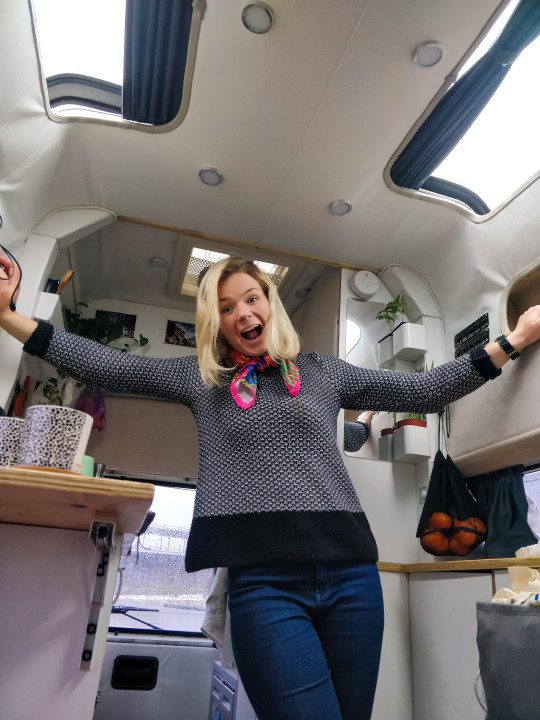
The week started with the announcement that the biggest event in the Valèncian calendar, Las Fallas, was cancelled. This came as a real shock to us (just as I was wrapping up last week’s blog post) and at the time, almost felt like a bit of an over-reaction. Of course, those closely following the development of Coronavirus around the world, and particularly in nearby Italy, would understand the motivation behind such a big decision.
On Tuesday morning I attended a free event about Innovation and Design in cities, hosted by a group called ‘Designscapes’ who are conducting research on the topic in the hope of developing public policy. I’d been invited by Ramon Marrades who we’ve been working with at La Marina, and I quite enjoyed attending an academic event after being outside of the urban design industry for a while. I wrote an overview of some of the key takeaways from the event here, which included speakers from the International Centre for Design and Research, Aalborg University and The Tavistock Institute. Unfortunately, the event was considerably impacted by Coronavirus, and not only was attendance greatly reduced but many of the speakers were also unavailable to be present.
Attending the Designscapes Policy Forum was certainly a wake-up call about how seriously Covid-19 might begin to affect public gatherings, but I would still not believe the situation we’d be in just one week later!
While the cancellation of Las Fallas had affected some of our commercial work, the next few days felt as though most other things were unaffected. Plans for the documentary that our channel Broaden are making about La Marina charged ahead.
On Tuesday afternoon, we met up with Ramon to discuss people we’d like to interview about La Marina, València’s seriously impressive waterfront precinct. He took us inside ‘La Base’, the old headquarters for the Swiss Alinghi sailing team, a relic from when València hosted the America’s Cup back in 2007. La Marina now uses the building for events and offices, and while it’s not yet used as often as it could, it has so much potential and is one of many cool assets in the marina.
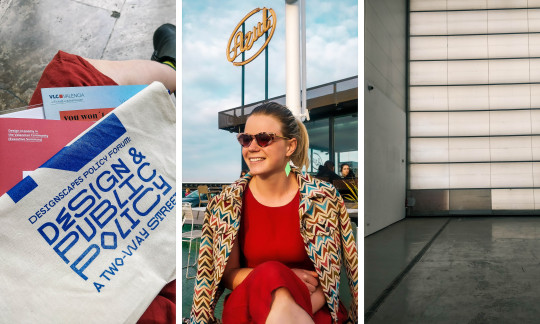
(images, left to right) Attending the Designscapes forum on innovation in cities, enjoying the sunset on the marina blissfully unaware of the lockdown that would soon be in place, and moody scenes from inside ‘La Base’, a building full of potential.
Filming for the documentary began on Wednesday morning, when we interviewed Manoel, a charming guy who has worked at La Marina for over a decade. Starting out as a deck hand, Manoel is now a senior staff member managing the nautical side of the marina, with its hundreds of moorings and associated facilities. It was fascinating to learn more about the operational side of running a place like this, and we were even treated to a guided boat ride around the marina which offered such a different perspective on this place we’ve both been documenting and staying in for over a week.
The following afternoon, we filmed our second interview, this time with with Julia Pineda, a socially-oriented architect from the co-operative practice ‘Crearqcio’ who has worked closely with La Marina. I was especially interested in the community engagement she had done, and the participatory processes with local residents and other stakeholders to explore names for new streets and decide on future uses for buildings there.
As George and I continue to work together as a videography duo, we’re refining the process of interviewing people, arranging shoots, preparing equipment and getting the perfect footage.
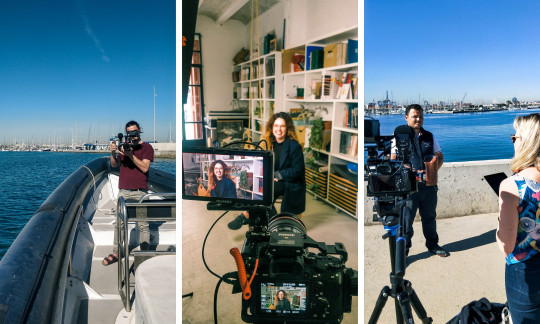
(images, left to right) Taking a boat ride around La Marina, speaking to Julia in Crearqcio’s office, and interviewing Manoel on a gloriously sunny day for the documentary.
Friday the 13th did indeed turn out to be pretty unlucky, as that’s when the situation in Spain relating to Coronavirus really escalated. We managed to squeeze in another interview with a member of La Marina’s team, the third of five interviews we had planned. Barbara was really accommodating and positive on camera, but even just the general vibe in the office while we were filming communicated that things were about to dramatically change.
By early evening, we were informed that some of our other commercial work would have to be completely cancelled, as all operations in Spain were starting to completely shut down.
It was Friday evening when warning came of the state of alarm which Spain was about to enter.
The declaration was made on Saturday: to ameliorate the spread of coronavirus, everyone in Spain is to stay at home, leaving the house only to buy groceries or medicine. All bars, restaurants, museums, cafes, and any other establishments that carry out public activity are to be closed and no one is to use public spaces. As the week continued, further measures have been put in place, such as the closure of the country’s land borders.
And that is pretty much when the predictability of my and George’s lives ended. Just like that: an extreme measure is brought into place which affects every aspect of your life - your income, your freedom to move, your travel plans, your activities and your family. Of course, that extreme measure has been brought into place because of an extreme situation, but if only I could warn Bryony from a week ago, perhaps I would have told her to prepare in some way. What might I have said? To stock up on food essentials, to buy a couple more books, to have more money saved up and most critically, to brace herself for the physical and emotional challenge of being confined to living exclusively inside Suzi the Van.
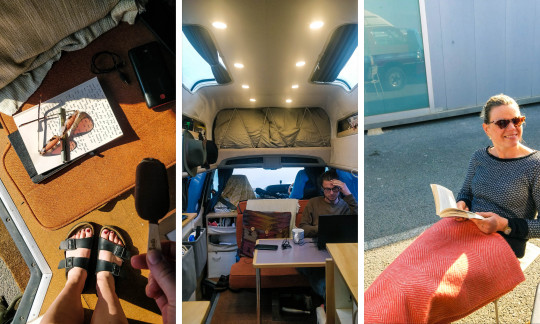
(images, left to right) Powering through confinement in a van by writing letters and eating icecream, George going a teeny tiny bit crazy in our mini house, and sitting just outside the van on my virtual ‘balcony’.
We have left the van once since Friday, to go out and buy some food. I’m someone who likes to get out and about, so this level of confinement is pretty intense.
Aside from the supermarket run (to Lidl, which was surprisingly well-stocked), George and I have ‘stayed at home’, here in Suzi at La Marina. I’ve been really keen to go and find a camping spot out in the countryside, where there might be more possibility of getting some fresh air and a walk, but we’re conscious that where we are right now has all the amenities we could need: flushing toilets, hot showers, a laundry, rubbish bins, water, drain, and even electricity (which we’ve resorted to using today amid stormy overcast weather). Plus, if the last week has taught us anything, it’s that you can’t be sure of how the next week may play out. The safest option is likely to stay put.
As people have reiterated online, a period of isolation is a pretty unique opportunity for many of us to indulge in activities we don’t get around to. Whilst I’m privileged to have already incorporated diary and blog writing as well as a lot of book-reading into my routine in the van, these last few days have seen me do that more than ever. I also made another collage, and even got around to editing together a collection of images I took back when I was working in Sydney. This short stop-motion animation (below) had me thinking about seeing something inspirational in the same repetitive scene.
View this post on Instagram
A post shared by Bryony Simcox (@bryonysimcox) on Mar 16, 2020 at 9:42am PDT
Might isolation do wonders for society’s increasingly short attention span and need for variety?
The current situation is a bizarre mix of feeling very isolated and very connected all at the same time. George and I use our phones a lot, and get constant updates both from formal news outlets and from friends and family. Anecdotes from Sydney and the UK, where measures aren’t quite as extreme yet, contrast with the sobering sentiments of scientists on podcasts or videos of Italians and Chinese who have been dealing with a total lockdown far longer than we have.
At times, I’ve even turned my phone off to try and tune out of the noise. Now that George and I are in lockdown, we aren’t able to contract Covid-19 nor spread it. So to a certain extent I feel as though keeping up-to-date as the crisis unfolds only makes me feel increasingly miserable and helpless.
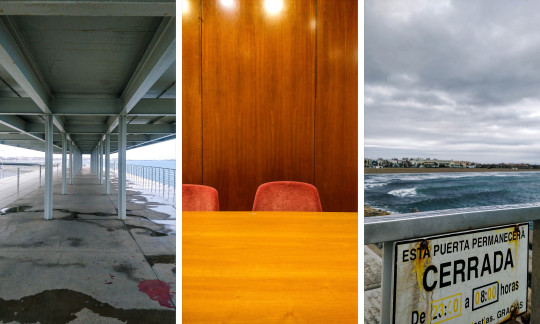
(images, left to right) The deserted walkway next to our van, empty offices at La Marina, and the beach as viewed from the closed gate which confines the part of the marina that we’re parked in.
If you let your mind project the implications of this virus in the future, it’s not too hard to find yourself in a dark place. Already, I see the failings of an economic system addicted to growth, the selfish panic-buying and disregard of facts by large swathes of people and the unfair advantage of exploitative multinational corporations. Take for example the fact that the aviation industry (led by millionaires, might I add) have banded together to ask for government payouts while young people, creatives, self-employed and zero-hour contract employees face a future of complete financial uncertainty.
I’m left asking questions like “how will people pay their rent?”, “where will this leave already vulnerable members of our society?” and “how will we even begin to rebuild life if and when this virus is tackled?”.
Of course, there are so many positive sides to be seen during this time too, and some of which offer answers to that last question. Already, we are seeing signs of generosity and kindness from health workers, neighbours, friends and strangers. We are seeing the emergence of an informal economy built on reciprocity and trust, where not just economic capital has value. We are seeing innovation on a massive scale, as people seek new ways of keeping their businesses alive, of cooking food with what’s left in their cupboards, of keeping the virus at bay and managing its spread, of boosting morale and of pooling resources.
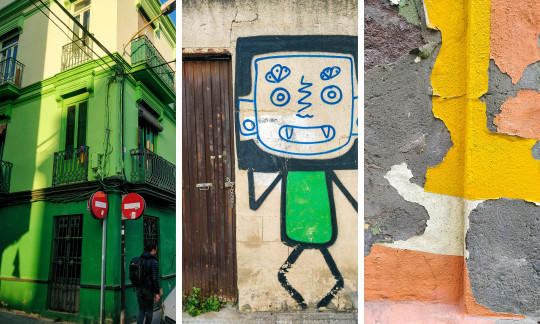
(images) I’m trying to see beauty in things and keep positive-minded, even if that means snapping these colourful scenes from the desolate streets on our walk to the supermarket.
In some ways, perhaps we needed an event of this magnitude to shake up the entire way in which we exist, and to rethink our systems of living.
The irony is that we already have another event which threatens humanity in this way, but which we have been largely ignoring. This is, of course, climate change and the terrifying rate at which the earth is warming up. Mother Nature has been shouting about the catastrophe we are charging towards for some time now, and yet it has taken direct deaths on home soil and a tangible ‘thing’ like Covid-19 for us to react in a collective and decisive way. It also goes without saying, that my heart breaks for all of the victims of this terrible virus to date, and I would never wish that it would take fatalities to call us to action.
This blog is usually a very personal reflection on a very personal journey: where my partner George and I attempt to cross the world in an old Japanese campervan, making videos along the way. But the arrival of this virus and its direct impact on our journey has triggered a different type of reflection. Perhaps in the coming weeks, during which I presume we will remain in lockdown, I will continue to write and reflect on what I think it is to be human in a difficult time, and to assess the situation which we are now all in, together as humanity.
I hope that my writing brings us together in some way, across oceans, balconies and phone screens. Whilst I’m pretty sure that George and I will still be parked up in a marina on the Spanish coast this time next week, who knows where we’ll be, collectively?
#traveldiaries#SuziTheVan#toyotahiace#overlandadventures#digitalnomads#BryonyandGeorge#vanlife#coronavirus#covid19#stateofalarm#estadodealarma#vanliving
1 note
·
View note